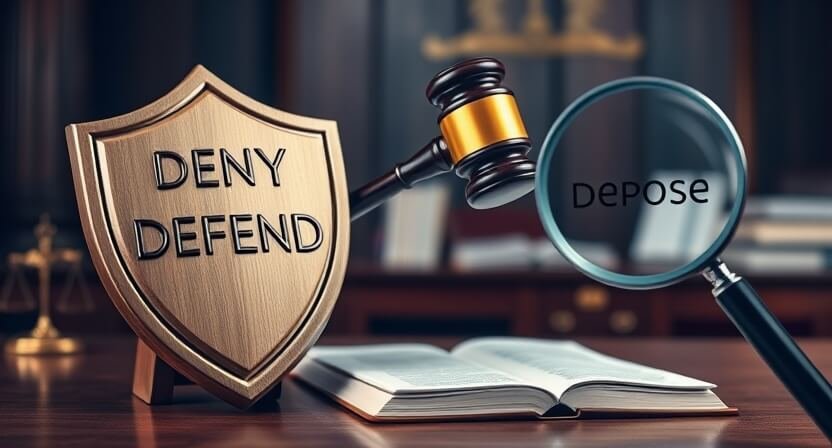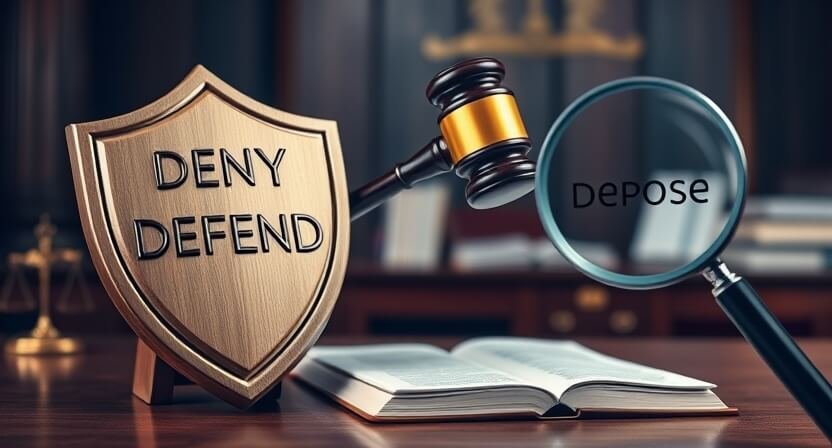
The Power Play of Deny, Defend, Depose in Legal Battles
Legal battles often feel like intense games of chess, where strategy determines victory. Three powerful moves—Deny, Defend, Depose—are central to this strategic dance, shaping the trajectory of court cases and disputes alike. But what do these terms mean? How are they used? And why do they hold such significant weight in legal proceedings?
In this comprehensive guide, we’ll delve deeply into each of these tactics, illustrating their importance, ethical considerations, and emotional impact. By the end, you’ll not only understand the mechanics of these strategies but also how to navigate them effectively.
The Power Play of Deny, Defend, Depose in Legal Battles
What Does Deny, Defend, Depose Mean?
At its core, the trio of deny, defend, and depose represents a sequence of actions often used in legal cases:
- Deny: The act of rejecting allegations outright, typically the first move of the accused.
- Defend: Building a case to counter claims, either by presenting evidence or questioning the opposition’s arguments.
- Depose: Gathering sworn testimony from witnesses during the discovery phase, often a turning point in litigation.
Each phase carries its own weight and requires a careful balance of preparation, precision, and persistence.
1. Deny: The First Line of Defense
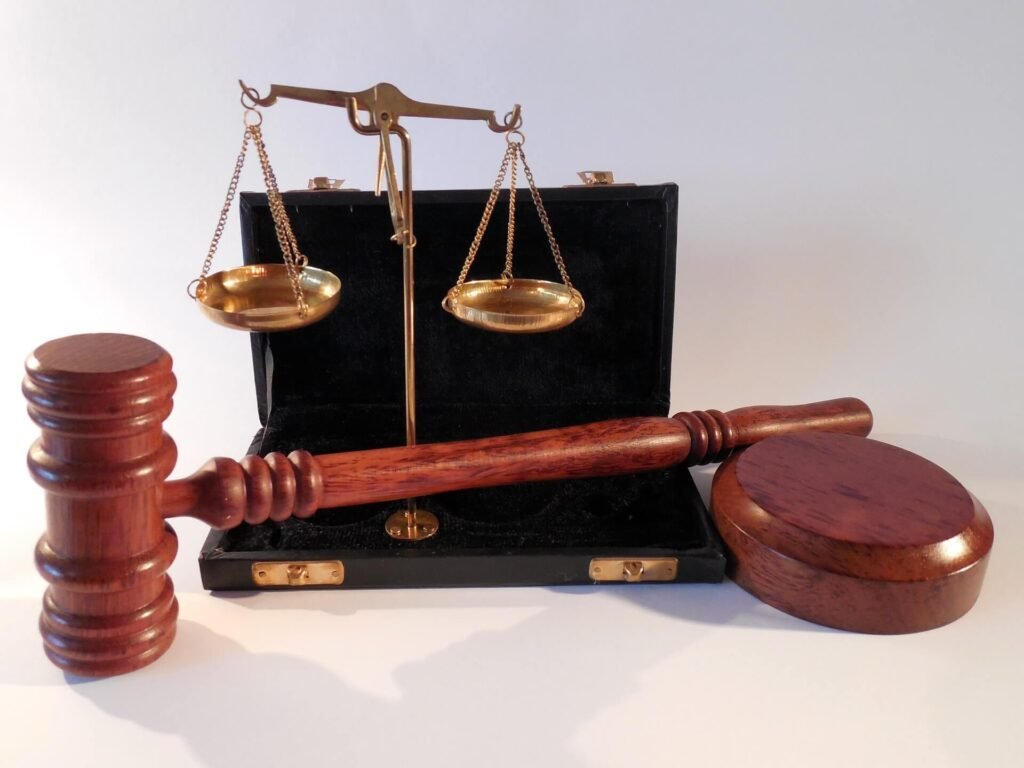
Denial is the immediate response when an individual or organization is accused of wrongdoing. It is not just a refusal but a tactical move that buys time and shapes the initial narrative.
Why Deny?
Denying allegations can serve several purposes:
- Shifting the Burden of Proof: In legal systems like the U.S., the burden of proof lies with the accuser. Denying wrongdoing compels the opposing party to gather and present substantial evidence.
- Maintaining Reputation: Particularly in high-profile cases, an immediate denial helps preserve public image. A strong public statement can mitigate damage while attorneys craft a detailed response.
- Creating Room for Strategy: Denial allows defendants and their legal teams to assess the situation, collect evidence, and formulate defenses without admitting fault.
The Emotional Side of Denial
Denial can evoke a mix of emotions:
- For Defendants: It often feels empowering, like a shield against accusations. However, it can also lead to isolation, especially if close relationships are strained by mistrust.
- For Accusers: A denial can feel invalidating and frustrating, especially if they believe they have strong evidence.
Real-Life Example
In employment disputes, a company accused of wrongful termination might immediately deny the claim. This denial forces the former employee to provide evidence, such as documentation or witnesses, to substantiate their case.
2. Defend: Building a Strong Case
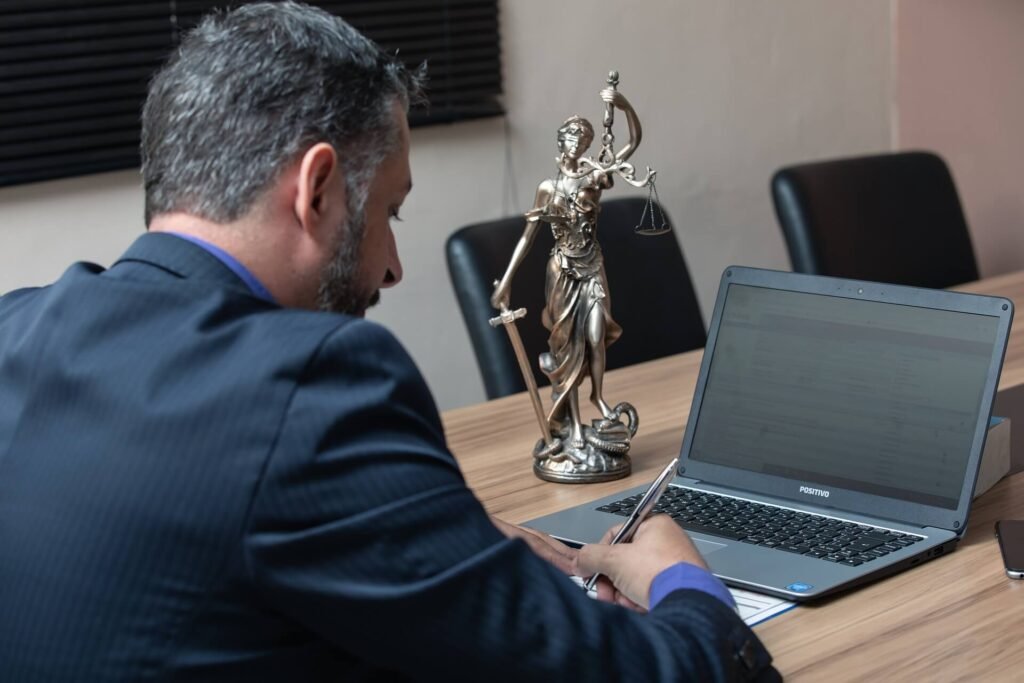
Once denial sets the stage, the focus shifts to defense. Defending involves countering the allegations through legal arguments, evidence, and procedural maneuvers. This phase demands meticulous preparation, as the quality of the defense often determines the outcome.
Types of Defense Strategies
- Affirmative Defense: Accepting some facts but providing a legal justification (e.g., self-defense in assault cases).
- Alibi Defense: Demonstrating that the accused was elsewhere when the incident occurred.
- Procedural Defense: Highlighting flaws in the case, such as improperly gathered evidence or missed deadlines.
The Emotional Chessboard
The defense phase is often an emotional rollercoaster:
- For Defendants: There’s hope in presenting their side but also fear of missteps that could weaken their case.
- For Accusers: Seeing their claims challenged can feel intimidating, as if their truth is being questioned or dismissed.
Interactive Moment
Imagine being accused of fraud. How would you defend yourself? Would you present documentation, call witnesses, or highlight procedural errors? Share your thoughts below!
3. Depose: The Discovery Weapon
Depositions are a critical step in the discovery phase, where attorneys question witnesses under oath outside of court. This step allows legal teams to uncover critical details, test arguments, and assess the credibility of witnesses.
The Role of Depositions in Legal Battles
Depositions serve multiple purposes:
- Uncovering Evidence: A well-conducted deposition can reveal new facts that might not have surfaced otherwise.
- Strengthening Arguments: By pinning down witnesses, attorneys can build stronger cases for trial.
- Intimidation and Pressure: Depositions often place significant stress on witnesses, sometimes leading to unintentional revelations.
Challenges and Emotions During Depositions
Depositions can be nerve-wracking for witnesses. Every word is scrutinized, and there’s immense pressure to remain consistent. Meanwhile, lawyers thrive on this tension, leveraging it to expose inconsistencies or vulnerabilities.
Pro Tip for Readers
Preparing for a deposition? Engage in mock sessions with your attorney. Practice answering confidently and concisely—it makes all the difference!
Ethical Implications: When Does Strategy Cross the Line?
While deny, defend, and depose are legitimate legal tools, they’re not without ethical concerns. These strategies can sometimes be exploited to manipulate outcomes or evade accountability.
Case Study: Corporate Scandals
In cases of corporate fraud, companies may initially deny allegations, then use aggressive defense and deposition tactics to delay justice or intimidate whistleblowers. This raises questions about fairness and the misuse of legal power.
Balancing Ethics and Strategy
- For Accusers: Focus on gathering irrefutable evidence and seek legal counsel to counteract aggressive tactics.
- For Defendants: Use these strategies responsibly, aiming for justice rather than avoidance of responsibility.
Life Lessons Beyond the Courtroom
Interestingly, deny, defend, and depose are strategies not just confined to legal battles. They’re also tools people unconsciously use in personal conflicts, workplace disputes, and even political debates.
Everyday Examples
- Deny: When someone refuses to acknowledge a mistake at work.
- Defend: Offering an explanation or justification for a decision.
- Depose: Seeking input from others to validate your side of the story.
How to Respond to These Tactics
- Stay Calm: Avoid emotional reactions that play into the other party’s hands.
- Document Everything: Keep records of conversations, emails, and actions that support your claims.
- Seek Support: Whether legal or personal, having an advisor can make navigating conflict easier.
Conclusion: Navigating the Legal Battlefield with Wisdom
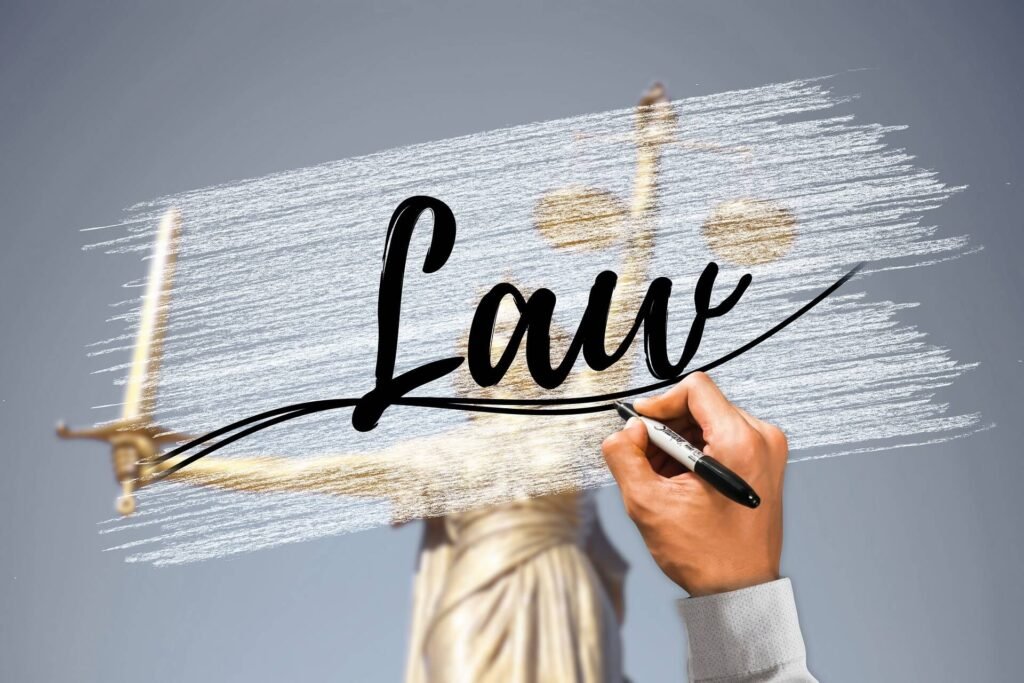
In the intricate arena of legal battles, mastering the trio of Deny, Defend, and Depose is like wielding a sword and shield—offering protection, precision, and the power to prevail. These strategies are not just cold, calculated moves; they are lifelines for justice and integrity. Whether you’re facing accusations, defending your truth, or uncovering hidden realities, understanding these tactics is essential.
But it’s not just about legal know-how—it’s about resilience. The emotional toll of denying false claims, standing firm in defense, or facing the pressure of depositions is immense. Yet, armed with the right strategy and support, you can navigate these challenges and emerge stronger, wiser, and victorious.
Remember, you don’t have to go it alone. Surround yourself with skilled advocates, remain steadfast in your truth, and embrace each step with courage.
Summary: The Power Play of Deny
- Deny: The first step in asserting your position, turning the focus onto the accuser to prove their claims. This is your opportunity to preserve your stance and gain time for strategic planning.
- Defend: Building your case with facts, witnesses, and robust arguments. Here, preparation meets perseverance as you counter the allegations.
- Depose: The discovery phase where truth often comes to light. Through depositions, you gain valuable insights and evidence to strengthen your case.
These strategies are not merely about winning—they’re about securing fairness and revealing the truth.
Interactive Wrap-Up
Have you ever faced a situation where you had to deny, defend, or uncover the truth? How did you navigate it emotionally and strategically? Share your experiences in the comments—we’d love to hear your stories and lessons learned!
And if you’re currently in the midst of a legal or personal conflict, remember: Knowledge is power. Strategy is strength. Courage is key. Stay informed, stay focused, and take the first step toward justice today!
Frequently Asked Questions(FAQs)
1. Why is denying allegations such a crucial first step?
Answer: Denying isn’t about avoiding the truth; it’s about protecting yourself while you gather evidence and build a strategy. Imagine being accused of something you didn’t do—denial puts the burden of proof back on the accuser. It’s your shield while you prepare for the fight ahead.
2. What happens if I deny an allegation but don’t have strong evidence yet?
Answer: Denying an allegation gives you time to collect evidence and explore your legal options. Think of it as hitting the “pause” button in the chaos. It doesn’t mean you’re dishonest—it’s a necessary move to ensure a fair chance to present your side.
3. How do I emotionally cope with defending myself during a legal battle?
Answer: Legal battles can feel overwhelming, but remember: you’re not alone. Surround yourself with a trusted legal team, supportive friends, and self-care practices. Defense isn’t just about arguments; it’s about your mental and emotional resilience. Take one step at a time, and remind yourself of your ultimate goal—justice.
4. What is the purpose of depositions? Aren’t they just another court formality?
Answer: Far from a mere formality, depositions are where the magic happens! They help uncover hidden truths, clarify conflicting statements, and strengthen your case. Think of them as the investigative chapter of your legal story. But yes, they can be stressful—so preparation and a clear mind are key.
5. Can the deny, defend, depose strategy work in personal conflicts too?
Answer: Absolutely! Whether it’s a workplace dispute, a family argument, or a community issue, the same principles apply. Deny false claims to protect your truth, defend your position with facts and empathy, and uncover the full story when necessary. It’s a life skill that goes beyond the courtroom.
6. What’s the biggest mistake people make when using these tactics?
Answer: The biggest mistake? Acting emotionally without strategy. In the heat of the moment, it’s tempting to overreact or say something that could hurt your case. Stay calm, consult with experts, and always think two steps ahead. Remember, a measured response often speaks louder than an emotional outburst.
7. How can I ensure I’m using these strategies ethically?
Answer: Ethics matter! Use deny, defend, and depose to reveal the truth, not obscure it. Being honest and transparent strengthens your credibility in the eyes of the court and the public. When in doubt, consult a legal professional to ensure your actions align with both your rights and your integrity.
8. How do I know if denying an allegation is the right move?
Answer: Denial is appropriate when the accusation is false or unsupported by evidence. If the claim lacks merit, denying sets the stage for a robust defense. Consult a legal expert to weigh your options, as they can help assess whether denial aligns with your situation and goals.
9. What if the other party has more resources or a stronger legal team?
Answer: Facing a well-funded opponent can feel intimidating, but remember: the strength of your case matters more than the size of their team. A skilled lawyer, thorough preparation, and your resilience can level the playing field. Truth and strategy often outweigh sheer resources.
10. How should I prepare for depositions to avoid being overwhelmed?
Answer: Preparation is key! Work closely with your attorney to anticipate questions, rehearse answers, and stay calm under pressure. Treat the deposition as a conversation, not an interrogation. And remember: it’s okay to pause, think, and request clarification if needed.
11. Can I use these strategies if I’m not hiring a lawyer?
Answer: While it’s possible to navigate simple disputes without legal representation, a lawyer is invaluable for complex cases. They understand the nuances of deny, defend, and depose strategies and can protect you from costly mistakes. Think of them as your partner in the journey toward justice.
12. What should I do if my emotions get in the way during the process?
Answer: It’s normal to feel stressed or emotional during a legal battle. Acknowledge your feelings, but don’t let them dictate your actions. Practice mindfulness, lean on a support system, and stay focused on your long-term goal. If necessary, seek professional help to manage the emotional toll.
13. How long do legal battles involving these strategies usually take?
Answer: The timeline depends on the complexity of the case, the court’s schedule, and the willingness of parties to negotiate. Some disputes resolve in months, while others take years. Patience and persistence are crucial—every step brings you closer to closure.
14. Can deny, defend, and depose be used in mediation or settlement discussions?
Answer: Absolutely! These strategies aren’t limited to the courtroom. In mediation, denying baseless claims, defending your position with evidence, and uncovering facts through dialogue can help achieve a fair settlement. They’re tools for justice in any setting.
15. What if I feel like the odds are stacked against me?
Answer: It’s natural to feel this way, especially when facing powerful opponents or difficult circumstances. But remember: every legal battle has its turning points. Stay committed, rely on your team, and trust the process. Justice has a way of favoring those who persist.
16. What should I do if I discover new evidence during the deposition phase?
Answer: New evidence can be a game-changer! Share it with your attorney immediately so they can adjust your strategy. This is why depositions are so valuable—they can uncover details that tip the scales in your favor.
17. Are there risks to using these strategies?
Answer: Like any approach, deny, defend, and depose come with risks. Denial without evidence can damage credibility, poor defense preparation may weaken your case, and depositions can expose vulnerabilities. Mitigate these risks by being honest, strategic, and well-prepared.
18. How do I stay motivated throughout a long legal battle?
Answer: Focus on your end goal—justice and resolution. Celebrate small victories, lean on loved ones for support, and take breaks when needed. Legal battles can be grueling, but every step you take is a testament to your courage and determination.
19. Can I use the depositions of others in court?
Answer: Yes, depositions can be used as evidence in court under certain circumstances. Your attorney will know how to leverage this tool effectively, especially if the deposition reveals inconsistencies or strengthens your argument.
20. What if I feel like giving up?
Answer: It’s okay to feel overwhelmed, but don’t give up. Take a moment to recharge, remind yourself why you’re fighting, and seek advice from your legal team or support network. Your perseverance is your power—stay the course, and justice will prevail.
21. Can the deny, defend, depose strategy backfire?
Answer: Yes, if not executed carefully. For instance, denying without justification can make you appear uncooperative, or mishandling depositions could weaken your case. That’s why preparation, honesty, and consulting legal experts are essential. A thoughtful, well-planned approach minimizes risks and maximizes your chances of success.
22. How can I ensure my case stays on track during a long legal battle?
Answer: Regular communication with your legal team is crucial. Stay informed about deadlines, new evidence, and court updates. Keeping organized records and reviewing your case periodically will help you stay engaged and proactive throughout the process.
23. What’s the role of witnesses in the deny, defend, and depose phases?
Answer: Witnesses can be game-changers. In the defend phase, they provide critical testimony that supports your case. During depositions, questioning witnesses from the opposing side can reveal inconsistencies or new evidence. Choosing credible, reliable witnesses strengthens your argument.
24. How do I choose the right lawyer to guide me through this process?
Answer: Look for a lawyer with experience in handling cases like yours. Review their track record, read client testimonials, and ensure they communicate clearly and compassionately. A strong attorney will not only represent you but also help you understand and execute each phase of the strategy effectively.
25. Can I resolve my case without going through all three steps?
Answer: Yes, not all cases require every step. Sometimes a strong denial or a robust defense leads to resolution before depositions are necessary. In other instances, mediation or settlement discussions might bypass lengthy court proceedings. Your lawyer can advise on the best approach based on your case’s specifics.

